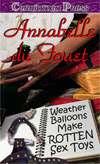 This book, in many ways, reminded me of Cut by Patricia McCormick. The styles seem to be very similar--easy/fast to read but the content is unsettling, to say the least. Self mutilation (Cut) and sexual abuse (Such a Pretty Girl) are difficult topics to cover well. It's easy to trot out the stereotypes and statistics and try to make characters out of them. Cut was loved by my eighth grade classes, but adults felt the book was, in the end, too easy, too uncomplicated for such an intense topic.
This book, in many ways, reminded me of Cut by Patricia McCormick. The styles seem to be very similar--easy/fast to read but the content is unsettling, to say the least. Self mutilation (Cut) and sexual abuse (Such a Pretty Girl) are difficult topics to cover well. It's easy to trot out the stereotypes and statistics and try to make characters out of them. Cut was loved by my eighth grade classes, but adults felt the book was, in the end, too easy, too uncomplicated for such an intense topic.Such a Pretty Girl does a better job of capturing the turmoil of sexual abuse than Cut did of self-mutilation, but even with the intense flashbacks (of both good times and bad with her father), it is still too uncomplicated. The whole story takes place over the course of just a week or so, from the time Meredith's father is released from prison to the time he is sent back. Conveniently, a cop living in the complex, as well as her best friend/boyfriend (who as a boy was also molested by her father) and her grandmother who lives across town, offer Meredith sorts of sanctuary since her mother is unwilling to do so.
Also, it is my understanding that men who are interested in molesting children are seldom interested after they've reached puberty, which is not the case here. Meredith's father seems determined, in a very Humbert Humbert way, to want to continue to want his daughter, no matter how old she gets. (Humbert Humbert wanted to continue to want Lolita, though he did eventually lose interest as she became a woman instead of remaining a "nymphet.")
In the end everything is just a little too neat--her kind of story (unfortunately) really wouldn't get such a bright red bow.


























